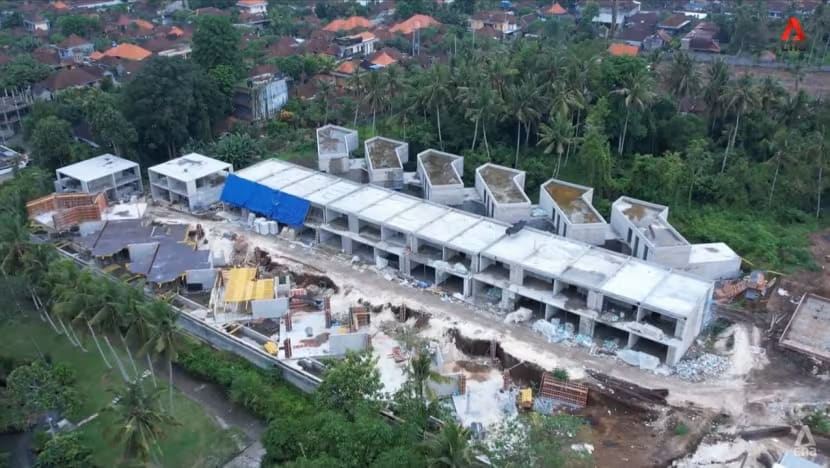Bali looking to suspend construction of new hotels in southern region as overdevelopment, overtourism bite
The Indonesian resort island has seen a rebound in foreign visitors since the COVID-19 pandemic decimated tourism. While the influx of travellers is revitalising the sector, issues - some of them familiar - are also surfacing.
.jpg?itok=8EmjZhqo)

This audio is generated by an AI tool.
Bali wants to temporarily halt the construction of new hotels and villas in its southern region, as the Indonesian resort island works to curb overdevelopment and preserve agricultural land amid an influx of tourism.
The planned moratorium on such developments will target the Sarbagita region, encompassing Denpasar, Badung, Gianyar, and Tabanan, according to the island’s acting governor Sang Made Mahendra Jaya.
The Bali government has formally requested the central government in Jakarta to enforce this measure.
"We have sent a letter to the ministry requesting a moratorium on new hotel and villa developments in Sarbagita," Mr Mahendra told local news site Kumparan on Wednesday (Sep 4). He did not specify how long he wants the suspension to last.
Tourism and Creative Economy Minister Sandiaga Uno has confirmed the proposal will be reviewed by his ministry and discussed at an upcoming cabinet meeting with President Joko Widodo, as reported by Indonesian media.
Mr Sandiaga emphasised that the moratorium has the support of academics and tourism stakeholders.
"We hope to temporarily halt construction in south Bali to prevent overtourism," he said on Tuesday (Sep 3).
The minister indicated that as part of the measure, the central government might solely manage future building permits in Bali, with local authorities playing a consultative role.
“The consultation process will include local leaders and community stakeholders. Given the current emergency situation, building permits in South Bali will be centrally regulated,” Mr Sandiaga explained.
Bali has seen a rebound in tourist arrivals since the COVID-19 pandemic decimated the sector. In 2021, only 51 foreign tourists visited the island, compared with 6.3 million in 2019.
Last year, the tally was close to 5.3 million. And numbers are looking rosy this year as well. According to data from Ngurah Rai airport immigration, Bali welcomed 3.89 million foreign tourists from January to July, up from 2.9 million during the same period in 2023.
Australians dominated arrival numbers with 877,329 visitors, followed by 328,767 from India and 278,329 from China. Travellers from countries like the United Kingdom, the United States, South Korea, Malaysia, and Singapore also made up a significant share.
As new developments sprout up to cash in on the tourist dollar, the trend has also raised concerns locally.
TURNING RICE FIELDS TO VILLAS
One is shrinking rice fields and the potential threat to Bali’s food security as a growing number are transformed into villas. The affected districts, mainly Gianyar and Tabanan, are critical agricultural areas.
The surge in villa development is driven by high demand from affluent individuals, both local and international, as well as the availability of golden visas for foreigners.
Villa prices in popular areas like Nusa Dua, Jimbaran, Sanur, and Ubud range from 2.2 billion to 5 billion rupiah (US$143,000 to US$325,000), while sizes vary from 100 to 500 square metres.

Local news outlet Tribun Bali reported in June that there has been an increase in illegal villa operations run by foreign tourists, without giving numbers.
Mr Kadek Adnyana, founder of the Bali Villa Rental and Management Association, pointed out that foreign-operated villas lacking proper permits are disrupting local businesses that follow regulations.
"This situation makes it difficult for local entrepreneurs who have invested in legal permits," he explained.
Mr Kadek called for the government to address those illegal operations to protect local Balinese businesses.
"They run businesses without paying taxes, while we, who have been operating legally for years, are required to adhere to regulations. The government needs to address and monitor illegal operations run by foreign tourists. This situation is causing us significant concern."
Bali acting governor Mahendra similarly pointed out the “inappropriate behaviour” of some foreign tourists as a reason for the moratorium. “We want to ensure that the permitting process is properly regulated," he added.
In addition to halting land conversion, the moratorium is also to assess the number of existing villas and streamline the management of hotel and villa development permits.
"We need to first manage the permit process to ensure that rice fields are not transformed into villas," Mr Mahendra added.
Some foreign tourists have been marrying Balinese residents to establish villa businesses, leading to further rice field conversions, shared Coordinating Minister for Maritime Affairs and Investment Luhut Binsar Pandjaitan.
"We are auditing the situation in Canggu, and it is unacceptable to repurpose rice fields into residential properties," Mr Luhut said at the press conference of Indonesia International Sustainability Forum 2024 in Jakarta on Thursday (Sep 5).

CURBING BAD TOURISTS
The minister also expressed his frustration with the bad behaviour of some foreign tourists, noting there are approximately 200,000 foreign tourists who reside in Bali.
“This situation leads to problems ranging from crime to fewer job opportunities for the local people,” Mr Luhut said.
Last year, Bali deported 340 foreigners, up from 188 in 2022, mainly from Russia, the US, the UK and Nigeria. Their violations included overstaying, working illegally and exposing themselves in sacred places.
In December, after a video of a payment dispute in a beauty salon went viral, two female tourists - an American and a Bermudian - were arrested for allegedly attacking salon staff, then deported in February, according to local police.
Earlier this year, police arrested three Mexicans for an alleged robbery that left a Turkish tourist wounded.
Mr Luhut emphasised the need for strict enforcement against foreign tourists who violate regulations, including immediate deportation and re-entry bans.
“We want quality tourism. We must ensure that Balinese culture is preserved because without it, tourism would not thrive. This needs to be managed properly,” he added.
Mr Luhut also criticised the rise of nightclubs featuring nude shows by foreign tourists, calling for a reduction in such venues.
"Bali is not a place for public nudity. Tourists seeking such experiences should go elsewhere. Bali must preserve its charm.”














